小升初高频考点剖析:第二篇专项提升第四部分时态精析第一节动词课件(55张ppt)
文档属性
| 名称 | 小升初高频考点剖析:第二篇专项提升第四部分时态精析第一节动词课件(55张ppt) |
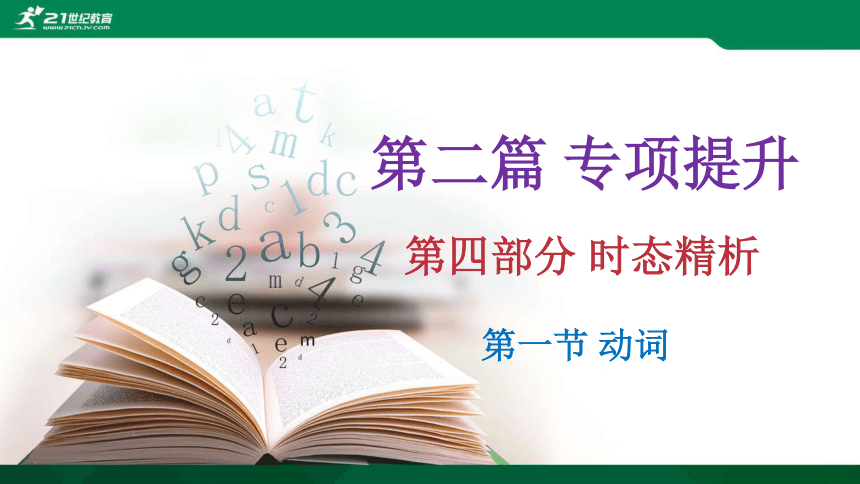
|
|
| 格式 | zip | ||
| 文件大小 | 1.2MB | ||
| 资源类型 | 试卷 | ||
| 版本资源 | 人教版(PEP) | ||
| 科目 | 英语 | ||
| 更新时间 | 2020-04-15 00:00:00 | ||
图片预览

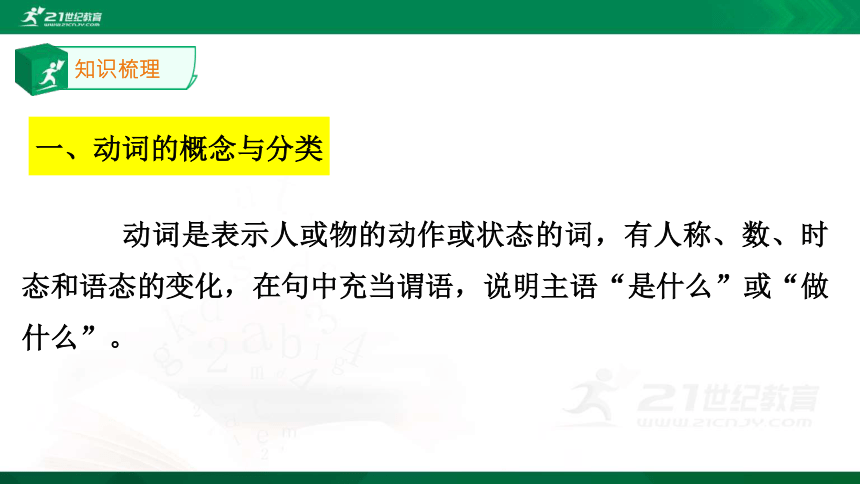

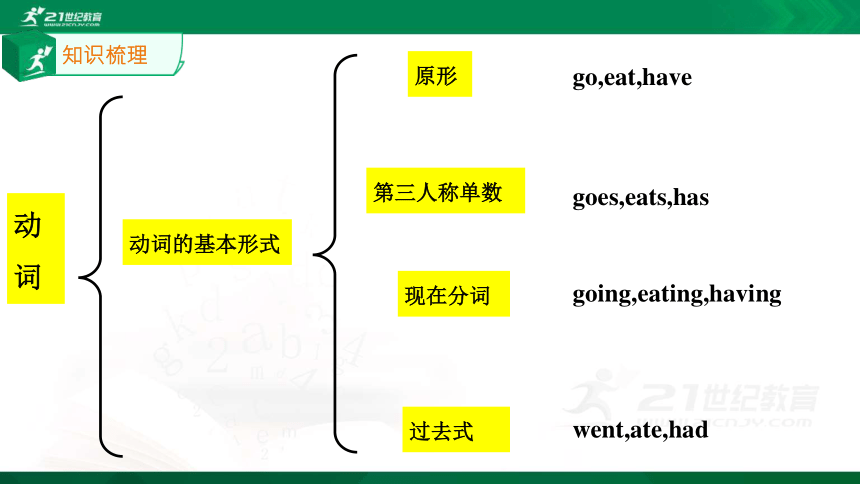
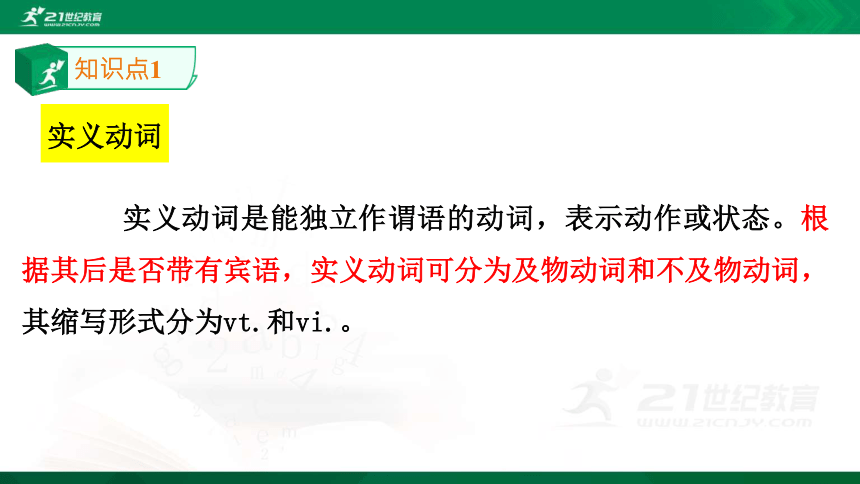
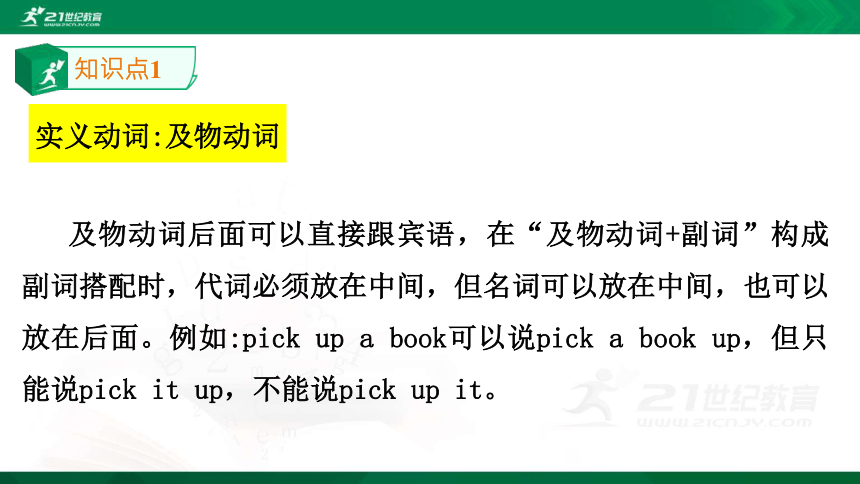
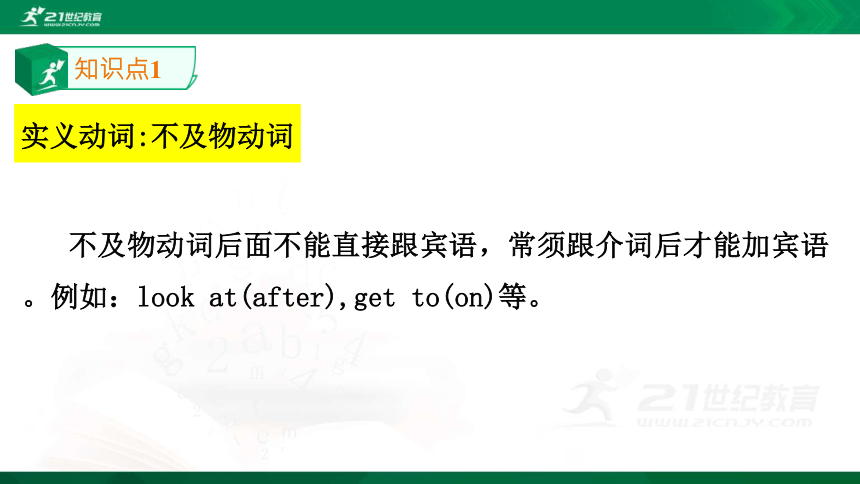

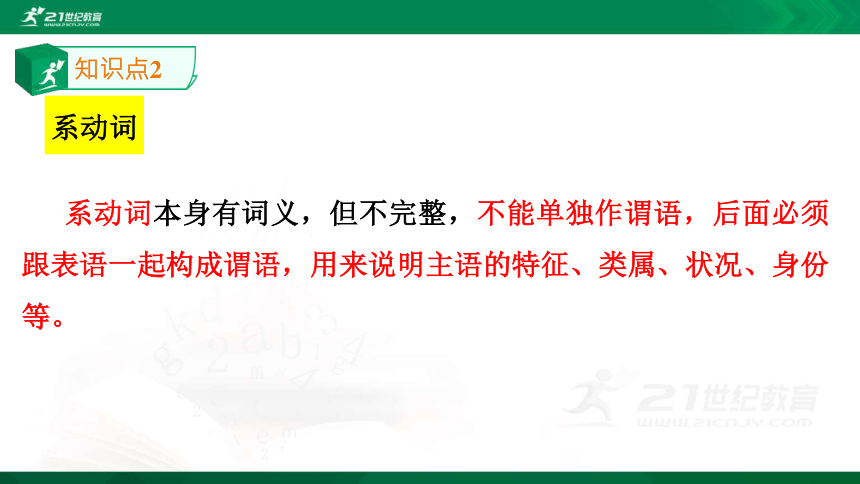
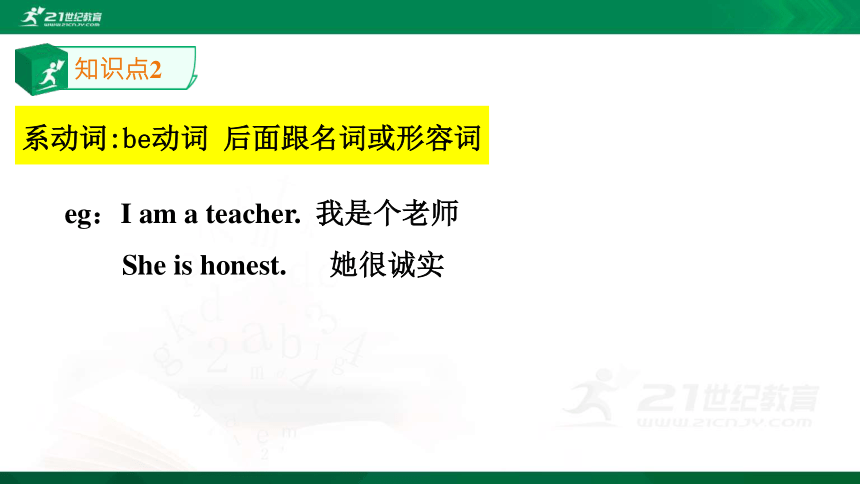
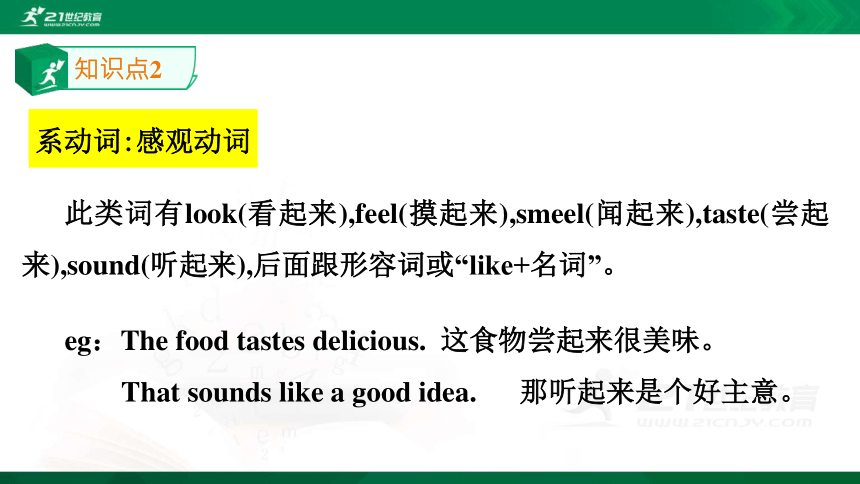
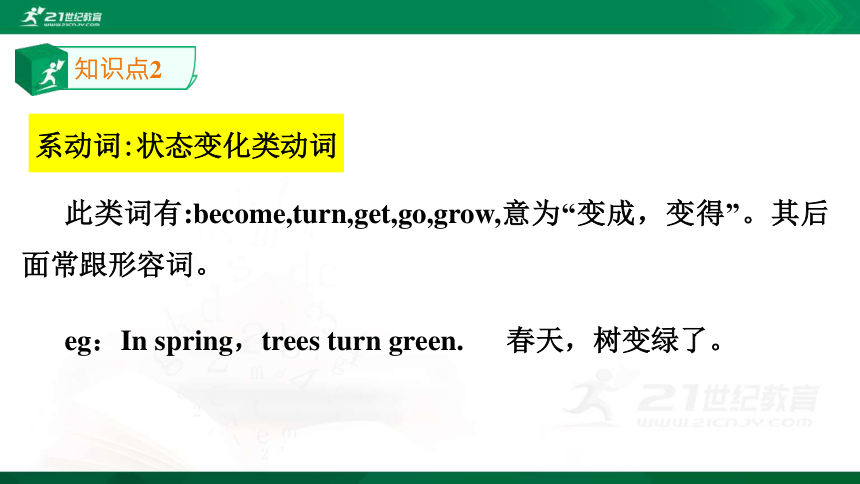
文档简介
课件55张PPT。第二篇 专项提升第四部分 时态精析第一节 动词知识梳理
动词是表示人或物的动作或状态的词,有人称、数、时态和语态的变化,在句中充当谓语,说明主语“是什么”或“做什么”。一、动词的概念与分类动词动词的分类实义动词及物动词 不及物动词助动词do(did,does)have(has) been doingwill/shall系动词be,get,become,feel等情态动词can, may, must, need, should, would知识梳理动词动词的基本形式原形第三人称单数现在分词过去式知识梳理go,eat,havegoes,eats,hasgoing,eating,havingwent,ate,had知识点1实义动词
实义动词是能独立作谓语的动词,表示动作或状态。根据其后是否带有宾语,实义动词可分为及物动词和不及物动词,其缩写形式分为vt.和vi.。知识点1实义动词:及物动词 及物动词后面可以直接跟宾语,在“及物动词+副词”构成副词搭配时,代词必须放在中间,但名词可以放在中间,也可以放在后面。例如:pick up a book可以说pick a book up,但只能说pick it up,不能说pick up it。知识点1实义动词:不及物动词 不及物动词后面不能直接跟宾语,常须跟介词后才能加宾语。例如:look at(after),get to(on)等。知识点1实义动词 小学阶段所学的实义动词有四种形式,即动词原形、第三人称单数形式、现在分词形式(动词的-ing形式)和过去式形式。如。知识点2系动词 系动词本身有词义,但不完整,不能单独作谓语,后面必须跟表语一起构成谓语,用来说明主语的特征、类属、状况、身份等。知识点2系动词:be动词 后面跟名词或形容词 eg:I am a teacher. 我是个老师
She is honest. 她很诚实知识点2系动词:感观动词 此类词有look(看起来),feel(摸起来),smeel(闻起来),taste(尝起来),sound(听起来),后面跟形容词或“like+名词”。 eg:The food tastes delicious. 这食物尝起来很美味。
That sounds like a good idea. 那听起来是个好主意。知识点2系动词:状态变化类动词 此类词有:become,turn,get,go,grow,意为“变成,变得”。其后面常跟形容词。 eg:In spring,trees turn green. 春天,树变绿了。知识点2系动词:保持类动词 此类词有:stay,keep等,后面跟形容词或名词。 eg:Please keep the classr clean. 请保持教室整洁。知识点3助动词 助动词本身无意义或意义不完整,不能单独作谓语,必须和其他动词连用,帮助构成各种时态、语态、否定句和疑问句等结构。常见的助动词有be,have(has),will,do(does),did等。知识点3助动词:be(am,is,are,was,were) 1.“助动词be+动词现在分词”构成进行时态eg: I am doing my homework now. 我正在做作业(现在进行时)知识点3助动词:be动词用法口诀我(I)用am,你(you)用are,
is跟着她(she)他(he)它(it)。
单数名词用is,复数名词全用are。
变问句,往前提,句末问号莫忘记。
变否定,也简单,be后来把not添。知识点3助动词:do(does/did)2.帮助构成一般疑问句eg:Do you like reading books? 你喜欢读书吗?
Did you study English? 你学过英语吗?知识点3助动词:do(does/did)3.do(does/did)+not 构成否定句eg:Mike did't go to school yesterday. 迈克昨天没有去上学。
Amy doesn't like maths. 埃米不喜欢数学。知识点3助动词注意:do、does主要用于一般现在时,当主语为第三人称单数时用助动词does,其余情况用do;did主要用于一般过去时态,且不随主语发生变化。知识点4情态动词情态动词本身有一定的词义,但不能单独作谓语,只能和动词原形一起构成谓语,表示说话人的情绪、态度和语气。情态动词无人称和数的变化,否定形式是在情态动词后面加not,变一般疑问句时需要把情态动词提前。常见情态动词有:can,many,must,need等。知识点4情态动词:can1.表示具有某种能力(体力、知识、技能),意为“会、能”eg: I can play the guitar. 我会弹吉他。知识点4情态动词:can2.表示请求、许可,意为“可以”,常在一般疑问句中。eg: Can I go outside now? 我可以去外面吗?知识点4情态动词:can3.表示推测,意为“不可能”,常用于否定句。eg: It's can't be Amy.She has going to the USA.
她不可能是埃米,她去了美国情态动词:must1.表示说话人的主观意志,意为“必须”。无人称、数和时态的变化。在否定句中用mustn't,但由must引起的一般疑问句u的否定答语用need't或don't have to,意为“不必”eg:We must study maths hard. 我们必须努力学习数学。
--Must I study at home? 我必须呆在家吗?
--Yes,you must./No,you need't./don't have to. 是的,你必须。/不,你不必。 (1)动词第三人称单数形式的构成
①一般情况下,在动词词尾加-s。如:like→likes,stay→stays, ②以ch,sh,s,x,o结尾的动词,在词尾加-es。如:teach→teaches,wash→washes,go→goes
③以辅音字母加y结尾的动词,改y为i,再加-es。如:carry→carries, try→tries
【注】以元音字母加y结尾的动词,直接在词尾加-s。如:play→plays, buy→buys
④不规则变化。如:have→has, be→is动词各种形式的规则变化 (2)动词现在分词形式的构成
①一般情况下,在动词词尾加-ing。如:do→doing,work→working
②以不发音的字母e结尾的动词,去e再加-ing。如:write→writing, make→making
③以重读闭音节结尾,且词尾只有一个辅音字母的动词,双写该辅音字母再加-ing。如:cut→cutting, sit→sitting, stop→stopping
④以ie结尾的动词,将ie改为y, 再加-ing。如:die→dying,lie→lying (3)动词过去式的构成
①一般情况下,在动词词尾加-ed。如:work→worked,play→played
②以不发音的字母e结尾的动词,在词尾加-d。如:like→likeed,live→lived
③以辅音字母加y结尾的动词,改y为i,再加-ed。如:cry→cried,study→studied
④以重读闭音节结尾,且词尾只有一个辅音字母的动词,双写该辅音字母再加-ed。 如:stop→stopped, plan→planned动词各种形式的规则变化动词过去式的不规则变化表考点精析考查动词的变化形式考点1He __________(wash) the clothes evey Saturday. 解析: 本题考查动词的第三人称单数形式。通过题目可以看出是一般现在时,而且主语是第三人称单数,所以动词应该跟随主语而变,应该填上动词的第三人称单数形式。答案为:washes一、Read and fill. 用括号内所给单词的适当形式填空。1. She __________ (study) in her school.
2. They __________ (work) at the airport.
3. I __________ (have) a question to ask him. yesterday
4. Your idea__________ (sound) great.
5. My father __________ (be) a teacher.
6. What __________ (do) he do the day before yesterday?
7. My mother often __________ (go) shopping on Saturdays.
8. I _________ (go) to the supermarket yesterday. studiesworkhadsoundsisdidgoeswent考查动词的综合运用考点2【例2】Read and fill. 用read的适当形式填空。
1. She can__________ (read) the book in the library.
2. She __________ (read) a book now.
3. Can I __________(read) this book now?
4. My father __________ (read) newspapers every morning.
5. A:Did you __________ (read) the comic book?
B:Yes, I __________ (read)it yesterday. 解析:本题围绕一个词read 展开,考查了不同时态、不同人称情况下,实义动词的用法。第1小题中can接原形动词;第2小题now表示的是现在,体现现在进行时,she 是第三人称单数,故“is+动词的-ing形式”是本小题需要的答案;第3小题不管后面出现什么,can接动词原形是做题关键;第4小题every morning 体现一般现在时,而my father是第三人称,故动词要用三单形式;第5小题did 之后加动词原形,答句中用过去式形式, read 的过去式和原形同形。
答案:1. 2. 3.
4. 5. read is readingreadreadsread; read二、Read and fill. 用括号内所给单词的适当形式填空。1. I am__________ (go) to wash my clothes.
2. My grandpa is __________ (come) to see us.
3. He __________ (get)up late yesterday.
4. He often __________ (play) basketball after school.
5. My father always__________ (go) to work by bike last yeargoingcominggotplayswent三、Read and choose. 单项填空。( )1. --What did you __________ yesterday?--I saw a film.
A. do B. does C. did
( )2. I am __________ to see a film with my friend next weekend.
A. went B. going C. goes
AB( )3. He is __________ to Sanya tomorrow.
A. flys B. is fly C. fyling
( )4. Amy:What are you doing?
Sam:I'm __________ a book.
A. read B. reads C. reading
( )5. My mother__________ last night.
A. worked B. works C. workingCCA一、Read and write. 按要求改写单词。1. go (第三人称单数形式) __________
2. took (动词原形) __________
3. big (反义词) __________
4. worker (动词形式) __________
5. tell (动词过去式) __________
goestakesmallworktold6. write (现在分词) __________
7. stand (动词过去式) __________
8. guess (第三人称单数形式) __________
9. win (动词过去式) __________
10. bought (动词原形) __________writingstoodguessesswonbuy二、Read, choose and fill. 选词填空,将下列短文补充完整。for, will, Seven, has, news, sad, going, other Linda and Kate are very1.______ because they are going to say goodbye to each2. ______. Kate is going away3. _____ a long time. She is4._______ to America. Her father5._____a new job there. It is good 6.______ for her father. But it is sad news for Kate and Linda. Kate 7.________ go to a new school in America. She will be in Grade 8._______. And Kate promises to write to Linda. sadgoingfornewshasotherwillSeven三、Read and fill. 用括号内所给单词或词组的适当形式填空。1. __________ (be) these John's ?
2. I can __________ (play) the piano every day.
3. Don't__________ (be) late for school.
4. Listen!Someone is __________ (sing)in the classroom.
5. Look! Who__________ (be) that woman over there?
6. Sarah _______playing basketball.
7. _______Sarah _______playing basketball ?
8. He __________ (work) in a school last year. Isplaybesingingislikesdidn't workDoeslike9. __________ (be)she at home last night?
10. Can I __________ (play) the drums?
11. My father likes __________ (read) books.
12. He __________ (visit) his grandpa last week.
13. She always __________ (go) to school buy bus last year.
14. I am __________ (leave)for Beijing tomorrow morning.
15. No __________ (eat)!
16. __________ (have) some grapes, please.
17. She __________ (go)to the movies three times a month. WasplayreadingvisitedwentleavingeatingHavegoes18. Now, I go __________ (cycle) every day.
19. The earths_________(move) around the sun.
20. A:What __________ (do)you often do at weekends?
B: I often __________ (visit) my uncle.cyclingmovesdovisit四、Read and choose. 单项填空。
( )1. Lucy:Do you __________ TV after dinner?
Lily: OK.
A. watch B. watching C. watches
( )2. Do you have any difficulty in __________ English?
A. speak B. speaking C. speaks
( )3. __________ they __________ shopping yesterday?
A. Did; go B. Do; go C. Did; went
ABA ( )4. I ____ to be a teacher when I grow up.
A. go B. am C. want
( )5. The sun __________ down in the west.
A. went B. going C. goes
( )6. I ____a gift for him.
A. buy B. bought C. go to buy
( )7. The flowers __________ to be watered every day.
A. needs B. need C. is needCCBB ( )8. I__________ him enter the room just now.
A. see B. saw C. am see
( )9. What do you ______ do this weekend?
A. plan B. planed C. plan to
( )10. What __________ you __________ yesterday?
A. do; do B. do; did C. did; do
( )11. Tony __________ to hospital by car last year.
A. goes B. went C. is goes
( )12. Mr Smith __________ to see you in an hour.
A. come B. comes C. will comeBCCBC
( )13. Listen!The birds are __________ in the tree.
A. sings B. sing C. singing
( )14. Li Lei __________ like rice, but his brother __________.
A. doesn't; do B. doesn't; does C. do;does CB五、Read and write. 按要求改写句子。1. They will climb the mountains next week. (改为一般疑问句)
_________________________________________________________
2. He is going to play basketball with Bob tomorrow. (改为一般疑问句,并作肯定回答)
一般疑问句:_____________________________________________
肯定回答: _______________________________________________
3. I am listening to music . (就画线部分提问)
__________________________________________________________
Will they climb the mountains next week?Is he going to play basketball with Bob tomorrow?Yes,he is.What are you doing?4. They are going to have a sports meeting next week. (改为否定句)
_________________________________________________________
They aren't going to have a sports meeting next week. 谢谢21世纪教育网(www.21cnjy.com) 中小学教育资源网站 有大把高质量资料?一线教师?一线教研员?
欢迎加入21世纪教育网教师合作团队!!月薪过万不是梦!!
详情请看:
https://www.21cnjy.com/help/help_extract.php
动词是表示人或物的动作或状态的词,有人称、数、时态和语态的变化,在句中充当谓语,说明主语“是什么”或“做什么”。一、动词的概念与分类动词动词的分类实义动词及物动词 不及物动词助动词do(did,does)have(has) been doingwill/shall系动词be,get,become,feel等情态动词can, may, must, need, should, would知识梳理动词动词的基本形式原形第三人称单数现在分词过去式知识梳理go,eat,havegoes,eats,hasgoing,eating,havingwent,ate,had知识点1实义动词
实义动词是能独立作谓语的动词,表示动作或状态。根据其后是否带有宾语,实义动词可分为及物动词和不及物动词,其缩写形式分为vt.和vi.。知识点1实义动词:及物动词 及物动词后面可以直接跟宾语,在“及物动词+副词”构成副词搭配时,代词必须放在中间,但名词可以放在中间,也可以放在后面。例如:pick up a book可以说pick a book up,但只能说pick it up,不能说pick up it。知识点1实义动词:不及物动词 不及物动词后面不能直接跟宾语,常须跟介词后才能加宾语。例如:look at(after),get to(on)等。知识点1实义动词 小学阶段所学的实义动词有四种形式,即动词原形、第三人称单数形式、现在分词形式(动词的-ing形式)和过去式形式。如。知识点2系动词 系动词本身有词义,但不完整,不能单独作谓语,后面必须跟表语一起构成谓语,用来说明主语的特征、类属、状况、身份等。知识点2系动词:be动词 后面跟名词或形容词 eg:I am a teacher. 我是个老师
She is honest. 她很诚实知识点2系动词:感观动词 此类词有look(看起来),feel(摸起来),smeel(闻起来),taste(尝起来),sound(听起来),后面跟形容词或“like+名词”。 eg:The food tastes delicious. 这食物尝起来很美味。
That sounds like a good idea. 那听起来是个好主意。知识点2系动词:状态变化类动词 此类词有:become,turn,get,go,grow,意为“变成,变得”。其后面常跟形容词。 eg:In spring,trees turn green. 春天,树变绿了。知识点2系动词:保持类动词 此类词有:stay,keep等,后面跟形容词或名词。 eg:Please keep the classr clean. 请保持教室整洁。知识点3助动词 助动词本身无意义或意义不完整,不能单独作谓语,必须和其他动词连用,帮助构成各种时态、语态、否定句和疑问句等结构。常见的助动词有be,have(has),will,do(does),did等。知识点3助动词:be(am,is,are,was,were) 1.“助动词be+动词现在分词”构成进行时态eg: I am doing my homework now. 我正在做作业(现在进行时)知识点3助动词:be动词用法口诀我(I)用am,你(you)用are,
is跟着她(she)他(he)它(it)。
单数名词用is,复数名词全用are。
变问句,往前提,句末问号莫忘记。
变否定,也简单,be后来把not添。知识点3助动词:do(does/did)2.帮助构成一般疑问句eg:Do you like reading books? 你喜欢读书吗?
Did you study English? 你学过英语吗?知识点3助动词:do(does/did)3.do(does/did)+not 构成否定句eg:Mike did't go to school yesterday. 迈克昨天没有去上学。
Amy doesn't like maths. 埃米不喜欢数学。知识点3助动词注意:do、does主要用于一般现在时,当主语为第三人称单数时用助动词does,其余情况用do;did主要用于一般过去时态,且不随主语发生变化。知识点4情态动词情态动词本身有一定的词义,但不能单独作谓语,只能和动词原形一起构成谓语,表示说话人的情绪、态度和语气。情态动词无人称和数的变化,否定形式是在情态动词后面加not,变一般疑问句时需要把情态动词提前。常见情态动词有:can,many,must,need等。知识点4情态动词:can1.表示具有某种能力(体力、知识、技能),意为“会、能”eg: I can play the guitar. 我会弹吉他。知识点4情态动词:can2.表示请求、许可,意为“可以”,常在一般疑问句中。eg: Can I go outside now? 我可以去外面吗?知识点4情态动词:can3.表示推测,意为“不可能”,常用于否定句。eg: It's can't be Amy.She has going to the USA.
她不可能是埃米,她去了美国情态动词:must1.表示说话人的主观意志,意为“必须”。无人称、数和时态的变化。在否定句中用mustn't,但由must引起的一般疑问句u的否定答语用need't或don't have to,意为“不必”eg:We must study maths hard. 我们必须努力学习数学。
--Must I study at home? 我必须呆在家吗?
--Yes,you must./No,you need't./don't have to. 是的,你必须。/不,你不必。 (1)动词第三人称单数形式的构成
①一般情况下,在动词词尾加-s。如:like→likes,stay→stays, ②以ch,sh,s,x,o结尾的动词,在词尾加-es。如:teach→teaches,wash→washes,go→goes
③以辅音字母加y结尾的动词,改y为i,再加-es。如:carry→carries, try→tries
【注】以元音字母加y结尾的动词,直接在词尾加-s。如:play→plays, buy→buys
④不规则变化。如:have→has, be→is动词各种形式的规则变化 (2)动词现在分词形式的构成
①一般情况下,在动词词尾加-ing。如:do→doing,work→working
②以不发音的字母e结尾的动词,去e再加-ing。如:write→writing, make→making
③以重读闭音节结尾,且词尾只有一个辅音字母的动词,双写该辅音字母再加-ing。如:cut→cutting, sit→sitting, stop→stopping
④以ie结尾的动词,将ie改为y, 再加-ing。如:die→dying,lie→lying (3)动词过去式的构成
①一般情况下,在动词词尾加-ed。如:work→worked,play→played
②以不发音的字母e结尾的动词,在词尾加-d。如:like→likeed,live→lived
③以辅音字母加y结尾的动词,改y为i,再加-ed。如:cry→cried,study→studied
④以重读闭音节结尾,且词尾只有一个辅音字母的动词,双写该辅音字母再加-ed。 如:stop→stopped, plan→planned动词各种形式的规则变化动词过去式的不规则变化表考点精析考查动词的变化形式考点1He __________(wash) the clothes evey Saturday. 解析: 本题考查动词的第三人称单数形式。通过题目可以看出是一般现在时,而且主语是第三人称单数,所以动词应该跟随主语而变,应该填上动词的第三人称单数形式。答案为:washes一、Read and fill. 用括号内所给单词的适当形式填空。1. She __________ (study) in her school.
2. They __________ (work) at the airport.
3. I __________ (have) a question to ask him. yesterday
4. Your idea__________ (sound) great.
5. My father __________ (be) a teacher.
6. What __________ (do) he do the day before yesterday?
7. My mother often __________ (go) shopping on Saturdays.
8. I _________ (go) to the supermarket yesterday. studiesworkhadsoundsisdidgoeswent考查动词的综合运用考点2【例2】Read and fill. 用read的适当形式填空。
1. She can__________ (read) the book in the library.
2. She __________ (read) a book now.
3. Can I __________(read) this book now?
4. My father __________ (read) newspapers every morning.
5. A:Did you __________ (read) the comic book?
B:Yes, I __________ (read)it yesterday. 解析:本题围绕一个词read 展开,考查了不同时态、不同人称情况下,实义动词的用法。第1小题中can接原形动词;第2小题now表示的是现在,体现现在进行时,she 是第三人称单数,故“is+动词的-ing形式”是本小题需要的答案;第3小题不管后面出现什么,can接动词原形是做题关键;第4小题every morning 体现一般现在时,而my father是第三人称,故动词要用三单形式;第5小题did 之后加动词原形,答句中用过去式形式, read 的过去式和原形同形。
答案:1. 2. 3.
4. 5. read is readingreadreadsread; read二、Read and fill. 用括号内所给单词的适当形式填空。1. I am__________ (go) to wash my clothes.
2. My grandpa is __________ (come) to see us.
3. He __________ (get)up late yesterday.
4. He often __________ (play) basketball after school.
5. My father always__________ (go) to work by bike last yeargoingcominggotplayswent三、Read and choose. 单项填空。( )1. --What did you __________ yesterday?--I saw a film.
A. do B. does C. did
( )2. I am __________ to see a film with my friend next weekend.
A. went B. going C. goes
AB( )3. He is __________ to Sanya tomorrow.
A. flys B. is fly C. fyling
( )4. Amy:What are you doing?
Sam:I'm __________ a book.
A. read B. reads C. reading
( )5. My mother__________ last night.
A. worked B. works C. workingCCA一、Read and write. 按要求改写单词。1. go (第三人称单数形式) __________
2. took (动词原形) __________
3. big (反义词) __________
4. worker (动词形式) __________
5. tell (动词过去式) __________
goestakesmallworktold6. write (现在分词) __________
7. stand (动词过去式) __________
8. guess (第三人称单数形式) __________
9. win (动词过去式) __________
10. bought (动词原形) __________writingstoodguessesswonbuy二、Read, choose and fill. 选词填空,将下列短文补充完整。for, will, Seven, has, news, sad, going, other Linda and Kate are very1.______ because they are going to say goodbye to each2. ______. Kate is going away3. _____ a long time. She is4._______ to America. Her father5._____a new job there. It is good 6.______ for her father. But it is sad news for Kate and Linda. Kate 7.________ go to a new school in America. She will be in Grade 8._______. And Kate promises to write to Linda. sadgoingfornewshasotherwillSeven三、Read and fill. 用括号内所给单词或词组的适当形式填空。1. __________ (be) these John's ?
2. I can __________ (play) the piano every day.
3. Don't__________ (be) late for school.
4. Listen!Someone is __________ (sing)in the classroom.
5. Look! Who__________ (be) that woman over there?
6. Sarah _______playing basketball.
7. _______Sarah _______playing basketball ?
8. He __________ (work) in a school last year. Isplaybesingingislikesdidn't workDoeslike9. __________ (be)she at home last night?
10. Can I __________ (play) the drums?
11. My father likes __________ (read) books.
12. He __________ (visit) his grandpa last week.
13. She always __________ (go) to school buy bus last year.
14. I am __________ (leave)for Beijing tomorrow morning.
15. No __________ (eat)!
16. __________ (have) some grapes, please.
17. She __________ (go)to the movies three times a month. WasplayreadingvisitedwentleavingeatingHavegoes18. Now, I go __________ (cycle) every day.
19. The earths_________(move) around the sun.
20. A:What __________ (do)you often do at weekends?
B: I often __________ (visit) my uncle.cyclingmovesdovisit四、Read and choose. 单项填空。
( )1. Lucy:Do you __________ TV after dinner?
Lily: OK.
A. watch B. watching C. watches
( )2. Do you have any difficulty in __________ English?
A. speak B. speaking C. speaks
( )3. __________ they __________ shopping yesterday?
A. Did; go B. Do; go C. Did; went
ABA ( )4. I ____ to be a teacher when I grow up.
A. go B. am C. want
( )5. The sun __________ down in the west.
A. went B. going C. goes
( )6. I ____a gift for him.
A. buy B. bought C. go to buy
( )7. The flowers __________ to be watered every day.
A. needs B. need C. is needCCBB ( )8. I__________ him enter the room just now.
A. see B. saw C. am see
( )9. What do you ______ do this weekend?
A. plan B. planed C. plan to
( )10. What __________ you __________ yesterday?
A. do; do B. do; did C. did; do
( )11. Tony __________ to hospital by car last year.
A. goes B. went C. is goes
( )12. Mr Smith __________ to see you in an hour.
A. come B. comes C. will comeBCCBC
( )13. Listen!The birds are __________ in the tree.
A. sings B. sing C. singing
( )14. Li Lei __________ like rice, but his brother __________.
A. doesn't; do B. doesn't; does C. do;does CB五、Read and write. 按要求改写句子。1. They will climb the mountains next week. (改为一般疑问句)
_________________________________________________________
2. He is going to play basketball with Bob tomorrow. (改为一般疑问句,并作肯定回答)
一般疑问句:_____________________________________________
肯定回答: _______________________________________________
3. I am listening to music . (就画线部分提问)
__________________________________________________________
Will they climb the mountains next week?Is he going to play basketball with Bob tomorrow?Yes,he is.What are you doing?4. They are going to have a sports meeting next week. (改为否定句)
_________________________________________________________
They aren't going to have a sports meeting next week. 谢谢21世纪教育网(www.21cnjy.com) 中小学教育资源网站 有大把高质量资料?一线教师?一线教研员?
欢迎加入21世纪教育网教师合作团队!!月薪过万不是梦!!
详情请看:
https://www.21cnjy.com/help/help_extract.php
